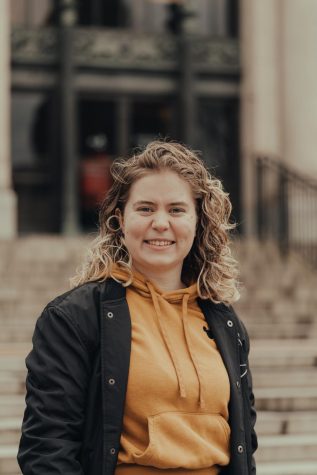Student Fee Committee votes to pass all fee requests, aims to support all students
January 17, 2021
The Student Fee Committee, in their second congressional meeting, decided to pass all the fee increases and decision packages requested by their units for the 2021-2022 school year.
While there were many questions and some disagreement surrounding a few of the units in the SFC meeting on Jan. 13, the Athletics Department was perhaps the most contested.
The SFC also voted to approve requests from the Memorial Union, Student Experiences and Engagement, Performing Arts, Recreational Sports, Family Resource Center, Human Services Resource Center and Associated Students of Oregon State University.
Although the Athletics Department did not ask for a decision package this year, they did request a 5.01% fee increase from $41.93 to $44.03 and said that a portion of this student fee money would go to Counseling and Psychological Services support for student athletes.
“We use the student fee to help with funding student-athlete wellness and mental health,” Kimya Massey, senior associate athletic director for Student Athlete Development, said via email. “We partner with CAPS on a position that is used within CAPS as well as within athletics.”
The decision to prioritize mental health for student athletes is something that the Athletics Department takes very seriously.
“It is important for all students to have access to CAPS, because we are in a time when people need to be supported and heard,” Massey said. “There are so many issues in our country right now that need to be addressed. Student athletes have the same issues but they also are held to a public standard, which can be a lot of pressure on top of being a student and an athlete.”
However, while mental health services are important for student athletes, as well as all students at OSU, funding these services is something that many ASOSU members think OSU should be doing, rather than the students themselves.
“I definitely think OSU should be putting a lot more funding into CAPS,” said Brendan Lefranc, an ASOSU Senator. “I also think it was mentioned [in the SFC meeting] that Oregon State legislature is introducing some kind of legislation for increased mental health services, either in general or in colleges specifically. So that would be great because that would force OSU’s hand, but I definitely think that CAPS should receive more funding directly from OSU, not just us paying athletics to pay CAPS.”
Lefranc also said that, despite their hesitancy, the main reason why the SFC decided to pass all the requested student fees is because if they were to be rejected, no one else would give these essential units the money that they need. All the units have resources that students need that they would not be able to provide had they not received SFC funding.
“We’ve been put between a rock and a hard place between the fees that we don’t want to have to pay, but the services that many people use and benefit from,” Lefranc said. “All these resources are important and needed, some more than others, but it would be detrimental to take those resources away while we try to find alternate funding sources when we don’t have a plan as of now… we didn’t want to take [those resources] away without a concrete plan to replace [them] because even though we don’t want students to pay those fees, that would just be irresponsible of us. And it has real, long-lasting implications.”
There were some units, however, that were passed with no disagreement due to their perceived high demand. Two of these units were the FRC and HSRC.
The FRC, which asked to go first due to many of them being parents with kids, asked for a 16% increase from $13.56 to $15.73 and a decision package of $1.49 per student per term. These requests were not questioned during the meeting and passed with a unanimous vote aside from a few members who did not vote.
“This approval means we can maintain our student parent programs at current service levels,” Heather King, chair of the FRC Advisory Board and Ph.D. Candidate in the school of public policy, said via email. “The funds we requested are needed to make up for inflationary costs and overall decreased enrollment at OSU (much of which is due to COVID right now).”
Due to the decreased enrollment, King said the FRC would have received less funding without a slight fee increase. This decreased funding could have meant that they would need to cut or reduce necessary programs such as Our Little Village or child care assistance funds, even though these programs remain in high demand.
“In addition, even though overall enrollment has decreased at OSU, we do not expect a decrease in our student parent population or in what parents at OSU need,” King said. “In fact, OLV enrollment numbers continue to increase.”
The HSRC was another unit with a unanimous vote to pass their fee request of a 27.28% increase from $14.99 to $18.99 and a decision package of $3.32.
Nicole Hindes, director of the HSRC, said that, without the approval of this fee increase, they would have needed to take the money out of MealBux, which is a program that gives students money on their student ID card so they can buy food on campus if they qualify. Through the approval of the decision package, they’ll be able to keep that program at the needed level to support students.
“We’re trying to keep our programs stable given a highly dynamic environment where things keep changing,” Hindes said. “We are moving more food, so there is more food going to students who need it… so we brought in some more staffing to support the operations and we rented a van for motor pool, though we’re going to actually buy a new one. So there are little tweaks and adjustments that we’re making to be more efficient.”
Additionally, Hindes said that the HSRC is serving about the same or perhaps even fewer students than normal, but that they shut down many programs to focus on those that students needed most. So, programs such as the food pantry, grocery support, and Healthy Beaver Bags have seen a massive increase in demand.
While many students may feel that they have little control over where their money goes, getting involved with ASOSU or the SFC and attending meetings can be a great way to stay informed and to have a voice.
”Student fees is such an important place for students to really show up. If our campus says this, our budget is where our values are actually in action,” Hindes said. “So I encourage folks to get involved in what next year might look at and be a part of making our campus one where everybody belongs.”
Students interested in learning more about ASOSU are encouraged to find the Barometer’s print issue about the ASOSU elections on newsstands around the Oregon State University campus when it is printed in February.




















































































![Newspaper clipping from February 25, 1970 in the Daily Barometer showing an article written by Bob Allen, past Barometer Editor. This article was written to spotlight both the student body’s lack of participation with student government at the time in conjunction with their class representatives response. [It’s important to note ASOSU was not structured identically to today’s standards, likely having a president on behalf of each class work together as one entity as opposed to one president representing all classes.]](https://dailybaro.orangemedianetwork.com/wp-content/uploads/2025/03/Screenshot-2025-03-12-1.00.42-PM-e1741811160853.png)
























